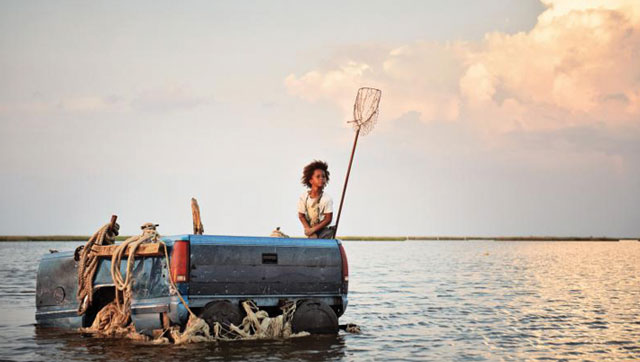American indie hit Beasts of the Southern Wild is set in a place so magical that it could be straight from a fable, though it is also as grounded as the New Orleans lashed by Katrina a few years ago. It’s a delta community cut off from the rest of the world by the levee and in danger of sinking beneath saltwater every time bad weather blows in.
Here, a feral scamp called Hushpuppy (Quvenzhané Wallis) lives with her father Wink in the poor but proud community of The Bathtub, which has chosen to shut out the modern world. They don’t have much, but six-year old Hushpuppy seems content, reasoning that The Bathtub has “more holidays than the whole rest of the world”.
When a storm bears down on The Bathtub and her father contracts a mysterious sickness of the blood, Hushpuppy’s world is turned upside down. She begins an odyssey in search of her lost mother and the strength to face down the aurochs awakened by the melting of the icecaps. It’s a simple story, but one that echoes with resonance.
Hushpuppy, brought to life by Wallis’s incandescent performance, is a vivid creation who bears comparison with other great child protagonists of southern American fiction such as Scout Finch and Tom Sawyer. It is through her eyes that we see the world as a place of terrible wonders and wonderful terrors.
Wallis, chosen from some 4 000 children who auditioned for the role, has a magnetic screen presence that many experienced actors would envy. There is nothing calculated about her performance.
One suspects that she is less acting than being herself for most of the time and making believe as children do for the rest of it.
The only part of the fierce but vulnerable Hushpuppy that is bigger than her imagination is her heart. Like all children, she is prone to magical thinking. “The whole universe depends on everything fitting together just right. If one piece busts, even the smallest piece … the whole universe will get busted,” she says at one point.
She has a complex relationship with Wink, played by New Orleans baker Dwight Henry in a raw performance of astonishing power. Through her eyes, he offers the tough love of a gruff protector and the casual cuffs around the ear of a bad-tempered drunk. Wink is a man who loves his daughter, yet seems to know he is ill-suited to the task of raising her on his own. There’s a deep-felt tenderness and sadness in Henry’s performance as Wink strives to prepare Hushpuppy to survive on her own when he’s gone.

Beasts of the Southern Wild is the first movie directed by Benh Zeitlin, who worked with Lucy Alibar to adapt her one-act play Juicy and Delicious for the cinema. He made the most of a tiny budget by using amateur actors and some clever improvisations in favour of special effects in a film that looks a little more expensive than it really is. He and cinematographer Ben Richardson show an eye for startling images, with many of the film’s shots lingering with me days after I saw the film.
Zeitlin makes a few missteps. An enthusiastic musician, he overindulges himself in the music he composed for the film. Though the score feels authentically Cajun, there are moments that it swells up with so much tearful pathos that it becomes completely overbearing. And like many indie filmmakers, Zeitlin is too fond of the handheld shaky cam as a means of getting close to its subject. Surely his US$2m budget could have stretched to a tripod?
But these technical nitpicks seldom break the spell that Beasts casts on the audience. Though it is rooted in Americana, Beasts reminded me a great deal of Hayao Miyazaki’s eco-parables, such as Princess Mononoke, in its seamless blending of the everyday and the fantastical. In its more mystical moments, it is also reminiscent of the way that Terrence Mallick links man’s personal struggles to meditations about humanity’s place in the universe.
Beasts of the Southern Wild is a small movie of staggering ambition. It is also a work of such burning sincerity and beguiling imagination that it simply defies intellectual analysis. — (c) 2012 NewsCentral Media
- Read more: Life outside the levee
- Read more: Interview with director Benh Zeitlin

